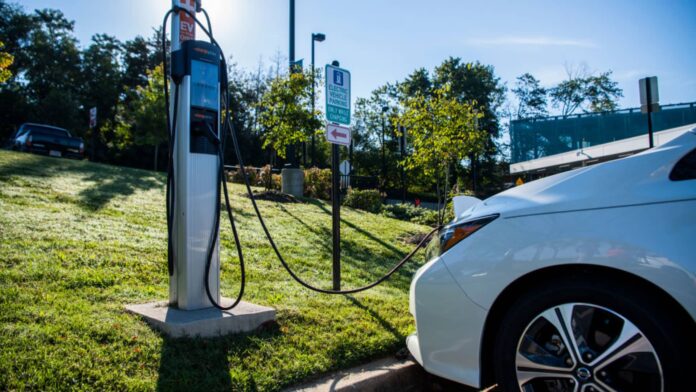The electric vehicle market will continue growing, and Goldman Sachs sees specific ways to play that in the battery market. The electric vehicle market will see an uptick in interest as a result of the Inflation Reduction Act’s tax credits , but has also been pressured by the effects of inflation, including more costly electricity, said Goldman analyst Kota Yuzawa. Still, the long-term outlook is strong, with electric vehicle penetration rising sharply amid a push to lower tailpipe emissions and achieve carbon neutrality, according to Yuzawa. He expects electric vehicle adoption to hit 61% by 2040. As a result, electric vehicles will claim much of the growth in the broader auto market. The electric vehicle-related profit pool is expected to grow to $133 billion in 2030 from just $2 billion in 2020, a 6550% change. By comparison, the industry as a whole will grow to $405 billion from $315 billion, a far more modest 29% growth, in the same time. As the market changes, Yuzawa expects profit pools to shift by region and product. One major winner thus far has been electric vehicle battery makers, he said, as pricing power has supported higher earnings. ‘Poised to grow’ Yuzawa said batteries will continue evolving, pointing to the introduction of lithium-iron-manganese-phosphate, or LFMP, batteries this year. And he said the future is in all-solid-state batteries, which have higher energy density, are safer and charge faster. “Technological innovations will be essential to overcome this sort of near-term noise,” he said in a note to clients. “We think the vehicle battery market is poised to grow substantially through 2040, with growth to be driven by development of new materials and the introduction of new battery designs.” He said the battery market is becoming increasingly concentrated, with the top five battery makers accounting for 83% of the market. By comparison, the top five automakers have a combined global market share of 41%. Meanwhile, Yuzawa said vehicle makers are rushing to create structures and lock in joint ventures to try to move battery making and other processes in-house. Companies such as solar power installers can also play a role in battery charging. Here are some of Goldman’s buy-rated stocks that it says are connected to the battery market and that trade in the U.S.: FREYR Battery is developing battery gigafactories and should be a beneficiary of the IRA, according to Yuzawa. Goldman Sachs has a price target of $19 on the stock, implying more than 120% upside from Monday’s close. One of the best-known electric vehicle names, Tesla , has internally developed battery cells and some core components such as motors in-house. Goldman has a $200 price target, which implies upside of 20% against Monday’s close. Tesla recently cut prices in a bid to buoy demand. The stock has struggled over the past year amid concerns over profit margins, as price multiples contracting in the wake of higher interest rates, and after CEO Elon Musk’s chaotic purchase of Twitter. Legacy automaker Stellantis makes battery packs and management systems in-house, with plans to also move battery cells in-house, while General Motors is also increasing its battery supply. Goldman expects Stellantis and GM’s shares to rise 33% and 16%, respectively, over where they closed Monday. GM said Tuesday it would invest $650 million in a lithium company in support of its electric vehicle business. But GM also said it didn’t expect to start producing notable volumes of electric vehicles until the second half of this year . TSLA GM,STLA 1Y mountain Tesla stock Looking at vehicle charging, Yuzawa is optimistic about Sunrun , SolarEdge and Enphase , which are known for solar energy systems and can also support electric vehicle charging infrastructure. Price targets set by Goldman show the stocks could rally 123%, 38% and 79%, respectively. — CNBC’s Michael Bloom contributed to this report
© heardonwallstreet.com


